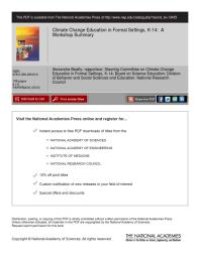
Ebook: Climate Change Education in Formal Settings, K-14: A Workshop Summary
Author: National Research Council, Division of Behavioral and Social Sciences and Education, Board on Science Education, K-14 Steering Committee on Climate Change Education in Formal Settings, Alexandra Beatty
- Tags: EDU010000, EDU029030, SCI042000
- Year: 2012
- Publisher: National Academies Press
- City: Washington, D.C., United States
- Edition: 1
- Language: English
- epub
Climate change is occurring, is very likely caused by human activities, and poses significant risks for a broad range of human and natural systems. Each additional ton of greenhouse gases emitted commits us to further change and greater risks. In the judgment of the Committee on America's Climate Choices, the environmental, economic, and humanitarian risks of climate change indicate a pressing need for substantial action to limit the magnitude of climate change and to prepare to adapt to its impacts. A principal message from the recent National Research Council report, America's Climate Choices, this brief summary of how climate change will shape many aspects of life in the foreseeable future emphasizes the vital importance of preparation for these changes. The report points to the importance of formal and informal education in supporting the public's understanding of those challenges climate change will bring, and in preparing current and future generations to act to limit the magnitude of climate change and respond to those challenges. Recognizing both the urgency and the difficulty of climate change education, the National Research Council, with support from the National Science Foundation, formed the Climate Change Education Roundtable. The roundtable brings together federal agency representatives with diverse experts and practitioners in the physical and natural sciences, social sciences, learning sciences, environmental education, education policy, extension education and outreach, resource management, and public policy to engage in discussion and explore educational strategies for addressing climate change. Two workshops were held to survey the landscape of climate change education. The first explored the goals for climate change education for various target audiences. The second workshop, which is the focus of this summary, was held on August 31 and September 1, 2011, and focused on the teaching and learning of climate change and climate science in formal education settings, from kindergarten through the first two years of college (K-14). This workshop, based on an already articulated need to teach climate change education, provided a forum for discussion of the evidence from research and practice. The goal of this workshop was to raise and explore complex questions around climate change education, and to address the current status of climate change education in grade K-14 of the formal education system by facilitating discussion between expert researchers and practitioners in complementary fields, such as education policy, teacher professional development, learning and cognitive science, K-12 and higher education administration, instructional design, curriculum development, and climate science. Climate Change Education in Formal Settings, K-14: A Workshop Summary summarizes the two workshops.
Download the book Climate Change Education in Formal Settings, K-14: A Workshop Summary for free or read online
Continue reading on any device:

Last viewed books
Related books
{related-news}
Comments (0)